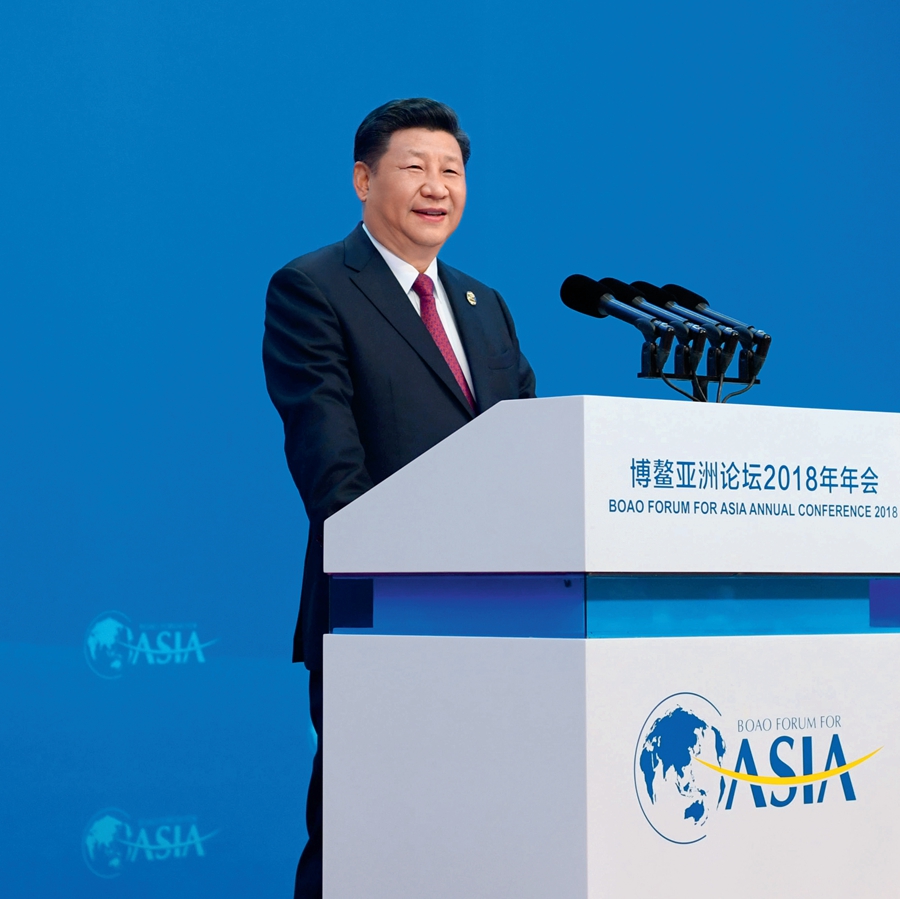By TIAN FEILONG
By TIAN FEILONG
THE 2018 Boao Forum for Asia (BFA) Annual Conference was a major diplomatic event hosted by China, with this year’s theme, “An Open and Innovative Asia for a World of Greater Prosperity.” With this year marking the 40th anniversary of the country’s reform and opening-up, visions of openness and development set the tone of this high-profile conference. The key topics of the forum – the Belt and Road Initiative and building a community of a shared future for mankind – undoubtedly boosted the confidence in and the formation of a consensus on economic globalization, free trade, and a more open and democratic global governance system.

President Xi Jinping delivers a keynote speech, titled “Openness for Greater Prosperity, Innovation for a Better Future,” at the opening ceremony of the Boao Forum for Asia Annual Conference 2018 on April 10.
The keynote speech delivered by President Xi Jinping conveyed China’s resolve to further deepen its reform and opening-up, and promote economic globalization and global governance reform. Xi also spoke about challenges that affect global peace and development and proposed China’s solution – building a community of a shared future for mankind.
Hailing the reform and opening-up as “China’s second revolution,” Xi stated it had not only profoundly changed China but also greatly influenced the entire world. Why does he call it the second revolution? Because China’s reform and opening-up is based on the Chinese situation, fully considering the changing domestic and international circumstances. Upholding the principles of achieving peace and development, China has significantly increased social productivity and deepened its involvement in global economic governance. Overall, China’s reform and opening-up has helped establish a solid foundation for national rejuvenation.
Alongside the reform and opening-up, China’s governance system and capability have substantially improved, and China has rethought its relations with the rest of the world. Both domestically and internationally, people can see the achievement and significance of the reform and opening-up.
Throughout the country’s current path of reform and opening-up, China strikes a balance between independent development and embracing the international community. There are certain principles in reform and opening-up, during which China’s national interests, political system, culture, national conditions, the will of its people, and global risks should be considered and balanced.
President Xi summarized China’s experience, stating that it independently explores its path and constantly improves its system of socialism with Chinese characteristics. First, China takes into account the domestic and international conditions of the present era. Doing so allows China to pursue coordinated development both at home and abroad. Second, China remains independent and open to the outside world in seeking win-win cooperation. Third, China upholds the system of socialism with Chinese characteristics, and continues reforms to develop the socialist market economy. Fourth, as famously stated by Deng Xiao-ping, “China crosses the river by feeling the stones (meaning to learn as it goes).” This has allowed China to continually refine its development plan.
This experience not only explains the secret of China’s success, but can also be shared with other developing countries. China actively promotes the Belt and Road Initiative and a community of a shared future for mankind, and consistently shares its development experience with other countries through extensive consultation, joint contribution, and shared benefits. President Xi emphasized that the Chinese people respect the right of people of all countries to choose their own social system and development path.
China strongly affirms that its current reform and opening-up is in line with the Chinese people’s interests, is conducive to boosting global peace and development, and is pursuing the goals of national rejuvenation and building a community of a shared future for mankind. In a new era when China has increasingly shouldered the responsibility for new globalization and global governance, China expects to see more interaction with the rest of the world in its ongoing reform and opening-up.
In his report to the 19th National Congress of the Communist Party of China last October, President Xi reiterated the concept of building a community of a shared future for mankind and the implementation plan. At this new historic juncture in China’s development, the country firmly upholds the rules of the WTO, respects multilateral trade systems, and is against any form of unilateralism such as a trade war.
Some of the biggest talking points in the Boao Forum were that China will significantly broaden its market access, improve the investment environment for foreign investors, strengthen protection of intellectual property rights, and take the initiative to expand imports. These measures will be implemented within the framework of the ongoing reform and opening-up, and sustained long into the future. China further emphasized that it is always open to countries and people who support a multilateral trade system and improvement of global governance.
The Boao Forum for Asia this year was held at a critical time, as economic globalization and the multilateral trade system face serious impediments. Xi’s speech at the forum conveyed a clear message that China will take firm actions to deal with trade protectionism and unilateralism, contribute its wisdom and plans to globalization and improvement of global governance, and share its experience of reform and opening-up over the past four decades. Overall, China aims to boost the confidence in and offer inspiration for improving global governance to make it fairer and universally better.
TIAN FEILONG is an associate professor at Beihang University’s Law School and a special researcher with the Central Institute of Socialism.